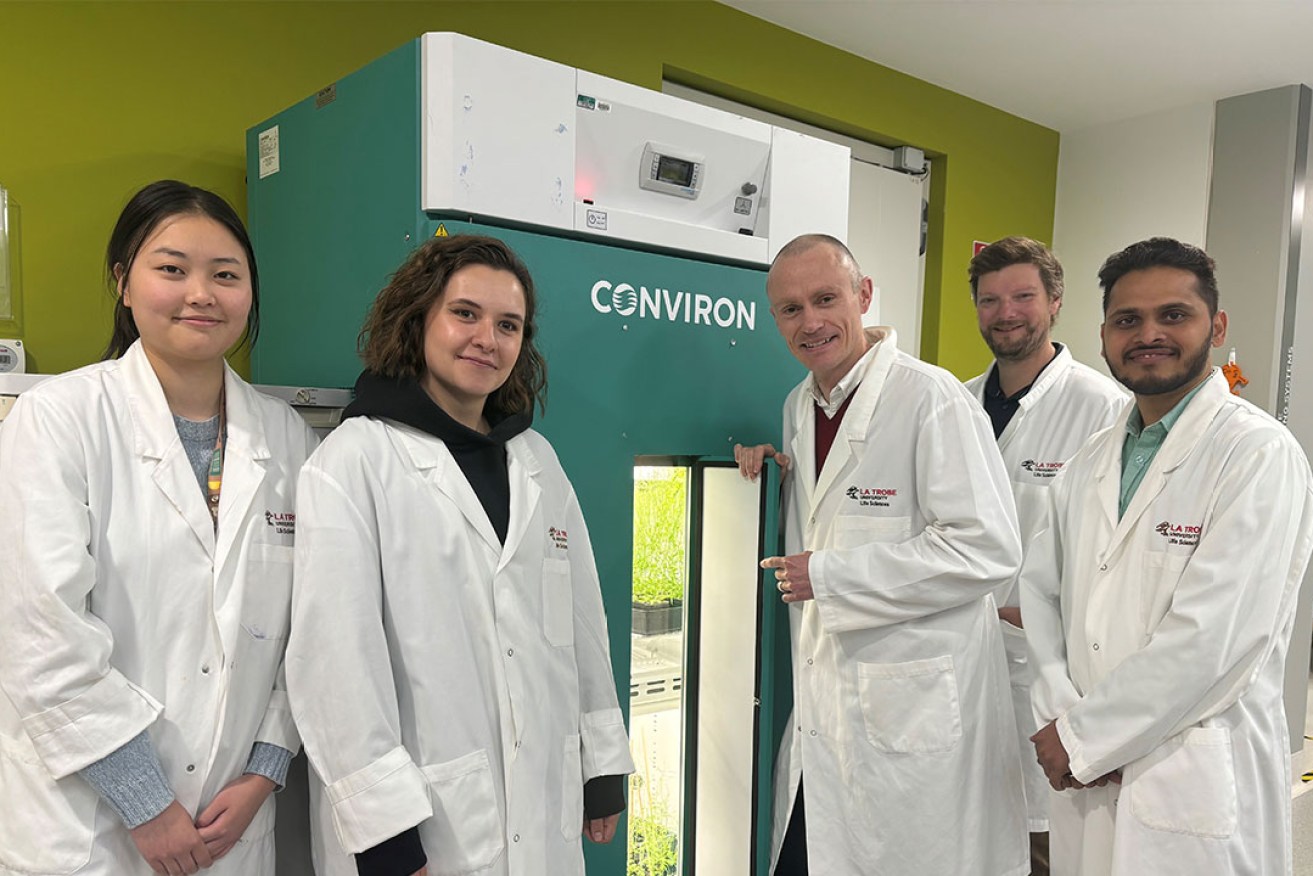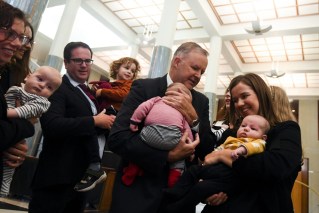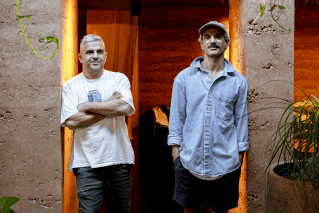Ground Control to Farmer Tom: Astronauts to pick up ploughshares on Artemis III mission to moon
The next manned moon mission will sow the seeds of off-earth agricultural science, as astronauts prepare to grow plants on the moon.

La Trobe honours student Jiayue Wang, PhD student Sofya Gvaramiya, Professor Mathew Lewsey, Dr Frazer Thorpe, and Bioinformatician Onkar Nath. (Image: Supplied).
When humans return to the moon in person for the first time in 50 years, during the Artemis III Mission slated to launch September 2026, they better remember to pack their trowel and spades.
NASA has announced that as part of this mission astronauts will be cultivating crops on the moon and bringing their lunar-grown plant life back to Earth – representing a fascinating scientific first.
The project, known as Lunar Effects on Agricultural Flora or LEAF, will investigate the lunar surface environment’s effects on space crops including photosynthesis, growth and systemic stress responses in space-radiation and partial gravity.
LEAF aims to collect data that will help scientists’ understanding and utilisation of plant growth in human nutrition and life support – on Earth, on the moon and possibly even beyond.
“This research will be a pivotal step toward understanding how we might use agriculture in space to support human crews, paving the way for sustained lunar exploration and even missions to Mars,” said Project Lead and Space Lab Vice President, Christine Escobar.
Led by Space Lab Technologies, the project includes a core group from the Australian Research Council Centre of Excellence in Plants for Space (P4S), headquartered at the University of Adelaide.
Other participants include La Trobe University, and NASA Kennedy Space Center, the United States Department of Agriculture and assorted American universities, with additional analysis to be conducted by the P4S node at the University of Western Australia.
The LEAF experiment includes a plant growth chamber with an isolated atmosphere that will be set up near the lunar South Pole.
Inside it, the plants chosen for celestial cultivation will include red and green varieties of Wisconsin Fast Plants®, a specialised cultivar of Brassica rapa, developed as a rapid life-cycle model organism for research and teaching, closely related to turnip, and bok choy; Wolffia or duckweed, hardy, cold tolerant and the fastest growing edible plant on the planet; and Arabidopsis thaliana, also known as thale cress or mouse-ear cress, which is used as a central genetic model and universal reference organism in plant and crop science.
All chosen plants are edible, small, and have had extensive scientific documentation on their earth-grown counterparts.
“The seeds we send to the Moon will germinate in an enclosed capsule, which we will be monitoring through a remote camera,” explained Professor Mathew Lewsey, of P4S and the La Trobe Institute for Sustainable Agriculture and Food.
“Our team of scientists will collect data on the plants as they grow on the moon, monitoring their size and morphology, then conduct genetic and metabolic analyses of individual cells when the plants return to Earth.
“We can then apply this knowledge to improve plant resilience to radiation and other environmental challenges.”
Professor Lewsey said that the findings of the LEAF investigation could be useful not just for feeding outer space explorers but also on planet Earth, as information about how plants grow in extreme conditions may prove invaluable in the face of worsening climate change.
“The learnings and technologies we gain by growing plants in a completely closed loop, as we must do in space, will provide new options for improving sustainable plant production and processing here on Earth,” said P4S Director and University of Adelaide Professor, Matthew Gilliham.
Head of the Australian Space Agency, Enrico Palermo said, “the technologies and practices developed as part of Plants for Space will improve life on Earth and benefit all Australians by addressing challenges like food security and water scarcity.”
Palermo suggested that the selection of Plants for Space for involvement in the Artemis III mission is a major vote of confidence in Australia’s space sector.
“This is another example of the cutting-edge space research and innovation happening in Australia, and the demand there is for us to contribute to generation-defining international missions,” he said.
Lauren Fell, who won the VAILO Inspiring Future Leader Award in InQueensland’s 2023 40 under 40 Awards is the director of Lunaria One, an Australian start up that also plans to seed plants on the moon – albeit under different parameters. Their Australian Lunar Experiment Promoting Horticulture (ALEPH) experiment is to be included on an unmanned moon mission and with a shorter 72-hour time scale.
“Our project is unique in the active involvement we will seek from citizen scientists and STEM enthusiasts of all ages in the project, as well as the unique collection of seeds and plants that we will test, which includes a fascinating set of species called resurrection plants,” she said.
Fell expressed her enthusiasm for the upcoming LEAF project. “There are a number of exciting space projects led by Australian institutions, companies and groups.
The great value of being part of the space industry in Australia is the uniquely collaborative nature of this field. Seeing life grow on the Moon is a big step towards a sustainable human presence on the Moon, and allows us to learn important lessons to assist sustainability here on Earth. We see this as a collective human initiative to be shared with the scientific and public community as we all work towards similar goals.”












